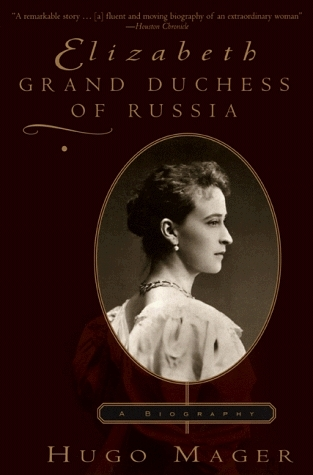Elizabeth: Grand Duchess of Russia by Hugo Mager
Summary (from the publisher): The story of the fabulously beautiful princess whose tragic marriage altered the course of European history.
The marriage of Queen Victoria's enchanting granddaughter Elizabeth to Grand Duke Serge of Russia in 1884 placed her at the dazzling center of the opulent court in St. Petersburg, until the brutal assassination of her husband in 1905. Five years later, the Grand Duchess had not only abandoned the Russian court but had wedded herself to the Russian Orthodox Church and founded a convent dedicated to Christian charity. Her profound faith wrought minor miracles for Moscow's hungry and poor, but it could save neither her sister Alexandra from the mesmeric hold of the sinister Rasputin nor herself from the bloody tide of Revolution and the Bolsheviks, who in 1918 imprisoned and with remorseless cruelty executed her.
Set against the backdrop of monumental events that from the Franco-Prussian War to the Russian Revolution forged the modern world, this compelling biography establishes Elizabeth - princess, duchess, nun, martyr, canonized saint - as one of the most fascinating women of the age.
Review: Born Princess Elizabeth of Hesse and by Rhine, Elizabeth was the second daughter of Ludwig IV, Grand Duke of Hesse and by Rhine and his wife Princess Alice, the second daughter of Queen Victoria. Despite her illustrious family background, she was raised in stern austerity: "She would quickly adapt to plain living and for the rest of her life consider luxury trivial" (28). She was considered the most beautiful princess in Europe and was a favorite granddaughter of Queen Victoria and had fond memories of time spent in England, running around Balmoral with her cousins and siblings. Despite her grandmother's objections, she insisted on marrying Grand Duke Sergei Alexandrovich of Russia, the fifth son of Emperor Alexander II of Russia, which escalated her to become one of the richest women in the grandest court in the world.
Despite defying her family to marry for what she believed to be love, her marriage was largely a disappointment. It seems her husband was not interested in her physically and treated her like a child. Regardless, she remained devoted to him until his assassination in 1905. Elizabeth is known for her role in organizing her younger sister's marriage to the future Tsar of Russia. In doing so, she "may unknowingly have tipped the scales of history" (120).
After her husband's gruesome death, Elizabeth donated all of her wealth, gave away her palaces, and joined a convent where she devoted herself to good work serving the poor and offering her nursing services to whoever needed it. "She was probably the only person of her rank in modern times to follow literally Christ's commandment, 'Sell that thou hast and give to the poor.'" (240). She was greatly beloved by the people of Moscow and "gained a charisma equal to that of Mother Teresa in modern Calcutta. They revered her as a saint, and called her matiushka, their holy mother" (247).
Tragically, just like her younger sister, her husband the tsar, and their children, Elizabeth was brutally murdered by the Bolsheviks in 1918. After being held in captivity for some months, she was marched to a mine shaft, knocked unconscious, and then thrown down the sixty foot passage. Eyewitnesses claim she and other victims survived the fall and they could be heard singing hymns from below ground until they finally succumbed to their wounds.
This was a fascinating biography about a member of the royal family who is much lesser known today but yet still has ties to the current royal family in England (she is a great-aunt of the late Prince Philip aka Queen Elizabeth II's husband). Her piety and devotion to good work is to be admired as is her bravery and willingness to suffer to serve the people. I loved this one.
Stars: 4
Related Titles:
- Victoria's Daughters by Jerrold M. Packard
- Victoria & Albert: A Royal Love Affair by Daisy Goodwin and Sara Sheridan
- We Two: Victoria and Albert: Rulers, Partners, Rivals by Gillian Gill
- Vicky: Princess Royal of England & German Empress by Daphne Bennett
- Matriarch: Queen Mary and the House of Windsor by Anne Edwards
- The Romanov Sisters: The Lost Lives of the Daughters of Nicholas and Alexandra by Helen Rappaport



Comments
Post a Comment